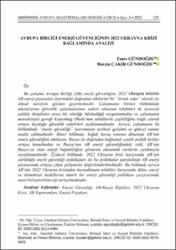Avrupa Birliği Enerji Güvenliğinin 2022 Ukrayna Krizi Bağlamında Analizi
Özet
Bu çalışma Avrupa Birliği (AB) enerji güvenliğini, 2022 Ukrayna krizinin
AB enerji piyasaları üzerindeki doğrudan etkilerini bir “örnek vaka” olarak ele
almak suretiyle gözden geçirmektedir. Çalışmanın birinci bölümünde
uluslararası güvenlik çalışmalarının askeri olmayan tehditleri de içerecek
şekilde disiplinler arası bir niteliğe büründüğü vurgulanmakta ve çalışmanın
metodolojisi gereği Kopenhag Okulu’nun tehditlerin çeşitliliğine bağlı olarak
ortaya koyduğu güvenlik sektörleri açıklanmaktadır. Ayrıca, çalışmanın bu
bölümünde “enerji güvenliği” kavramının tarihsel gelişimi ve güncel tanımı
analiz edilmektedir. İkinci bölümde, Soğuk Savaş sonrası dönemde AB’nin
enerji güvenliğini etkileyen, Rusya ile doğrudan bağlantılı çeşitli politik krizler
ortaya konulmakta ve Rusya’nın AB enerji güvenliğindeki rolü, AB’nin
Rusya’ya olan enerji bağımlılığını gösteren ekonomik verilerin yardımıyla
sergilenmektedir. Üçüncü bölümde, 2022 Ukrayna krizi karşısında AB’nin
yürüttüğü enerji güvenliği politikaları ile bu politikalar paralelinde AB enerji
piyasasında ortaya çıkan gelişmeler değerlendirilmektedir. Bu bölümde ayrıca
AB’nin 2022 Ukrayna krizinden kaynaklanan tehditler karşısında iklim, enerji
ve demokrasi hedeflerini tutarlı bir enerji güvenliği politikası çerçevesinde
nasıl birleştirebileceği tartışılmaktadır. This study reviews the European Union’s (EU) energy security by
considering the direct effects of the 2022 Ukraine crisis on the EU energy
markets as a “case study”. In the first part of the study, it is emphasized that
international security studies have an interdisciplinary nature, including nonmilitary threats, and the security sectors that the Copenhagen School has
revealed depending on the diversity of threats are explained according to the
methodology of the study. Additionally, the historical development of the
concept of “energy security” and its current definition are analyzed in this part
of the study. In the second part, several political crises directly associated with
Russia which affected the EU’s energy security in the post-Cold War period are
introduced, and Russia’s role in EU energy security is presented with the help
of economic data demonstrating the EU’s energy dependence on Russia. In the
third part, the energy security policies of the EU in the face of the 2022 Ukraine
crisis and the developments in the EU energy market in parallel with these
policies are discussed. In this part, it is also discussed how the EU can combine
its climate, energy, and democracy objectives within the framework of a
coherent energy security policy in the face of the threats arising from the 2022
Ukraine crisis.

















